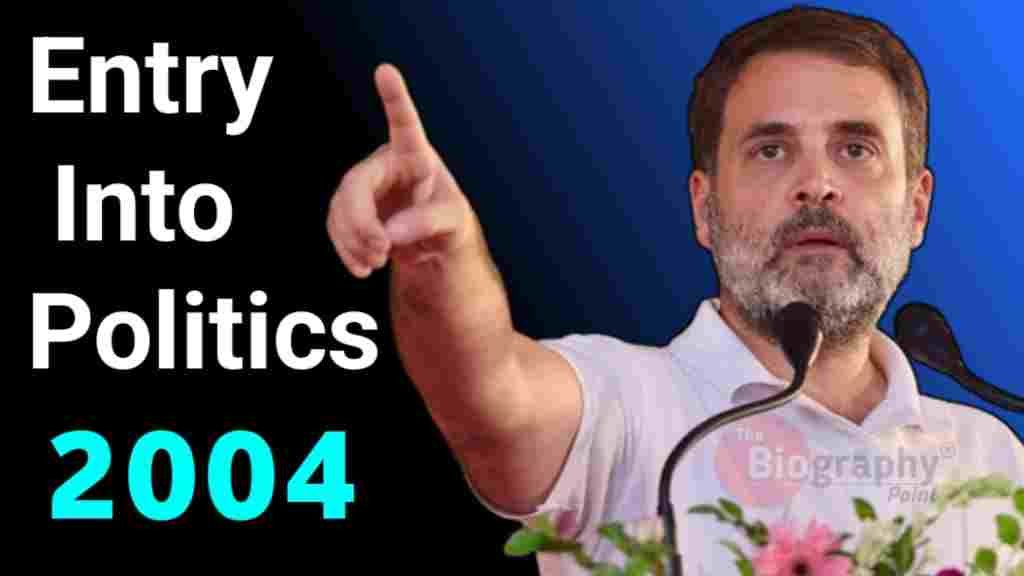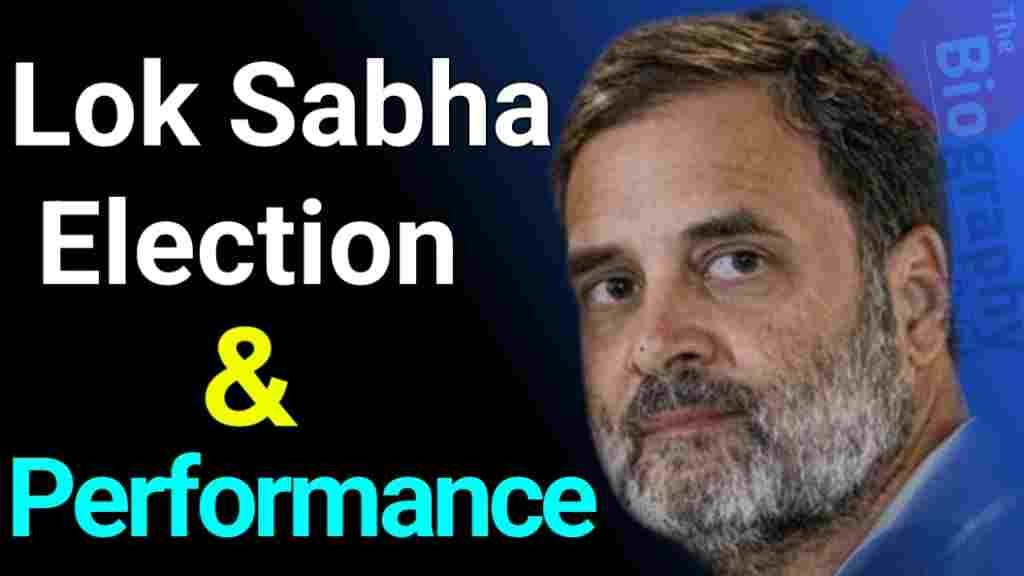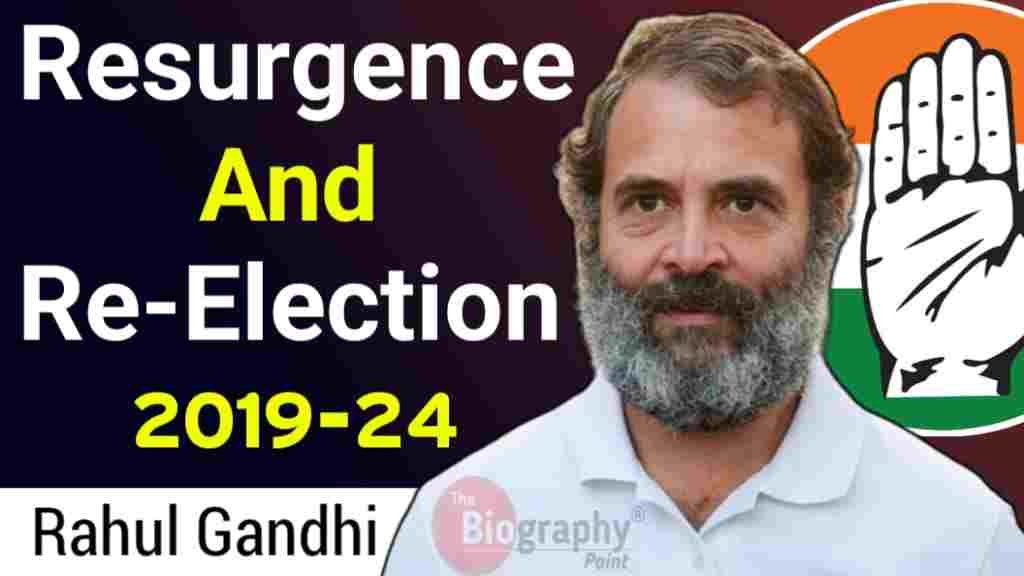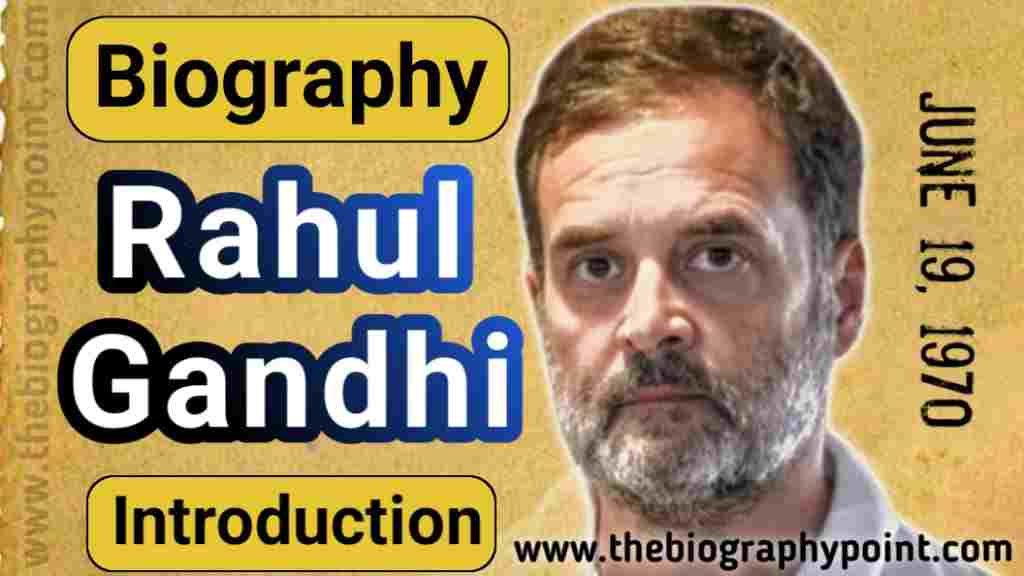| Full Name | Rahul Rajiv Gandhi |
| Born Date | June 19, 1970 |
| Born Place | New Delhi, (India) |
| Name Of Mother’s | Sonia Gandhi |
| Name Of Father’s | Rajiv Gandhi |
| Marital Status | Unmarried |
| Name of Sister | Priyanka Gandhi |
| Family | Gandhi Family |
| Political Party | INC |
| Profession | Political |
| Net Worth | 15 Crore |
| Nationality | Indian |
Also Read
Introduction
Rahul Gandhi is a very important leader in India. He belongs to the Indian National Congress and comes from the Nehru-Gandhi family, which has been influential in Indian politics for a long time. Rahul Gandhi was born into a family of leaders and has had a tough journey with personal losses, political problems, and trying to make the INC stronger again. This book is about his life, talking about where he comes from, where he went to school, his time in politics, and the problems he has dealt with.
Early Life and Education
Rahul Gandhi was born in New Delhi, India on June 19, 1970. His parents are Rajiv Gandhi and Sonia Gandhi. His grandmother from his dad’s side, Indira Gandhi, was the leader of India when he was born. Rahul grew up in a family that was very involved in Indian politics.
He started going to school at St. Columba went to school in Delhi and then moved to The Doon School in Dehradun, where his father had also gone to school. Because of safety worries after their grandmother, Indira Gandhi, was killed in 1984, Rahul and his sister Priyanka were taught at home for a while.
Rahul Gandhi went to Harvard University for college, but he moved to Rollins College in Florida after his father, Rajiv Gandhi, was killed in 1991. He finished college in 1994 with a degree in Arts. Later, he studied for an M. Phil I am studying Development Studies at Trinity College, Cambridge.
Entry into Politics

Rahul Gandhi started his political career later than other members of his family. He started his political career in 2004 by running for elections in the same area his father used to represent in Uttar Pradesh. He talked a lot about making things better and having new leaders. He won by a lot and this was the start of his political career.
Political Career and Leadership Roles
After he was voted in as a member of the Lok Sabha, Rahul Gandhi started doing different jobs in the INC. In 2007, he was chosen to be the leader of the All India Congress Committee. His job was to lead the Youth Congress and the National Students Union of India. Under his direction, these groups got a new burst of energy. He focused on being clear and open, allowing everyone to have a say, and bringing in young people with skills.
Rahul wanted to make changes in the Youth Congress and NSUI to appeal more to young voters and make the party more modern. He searched for talented people, provided training, and chose leaders for the organizations.
Lok Sabha Elections and Performance

Rahul Gandhi has had both good and bad experiences in his political career. In 2009, the INC, led by Sonia Gandhi and with Rahul’s help, won 206 seats and became the biggest party in the Lok Sabha. Rahul kept his position in Amethi with a big win.
But, the 2014 elections were a very important time for Rahul Gandhi and the INC. The party did very badly in the election, and only got 44 seats, which is its worst result ever. Rahul kept his position in Amethi but people were mad because his party didn’t do well. The election results made the INC think about what went wrong and people are asking for changes in the organization.
Problems and negative comments
Rahul Gandhi has faced a lot of problems and negative comments in his political career. Many people think he doesn’t really want to be a politician and doubt if he’s a good leader. People have laughed at his speeches and public appearances and he has been closely watched and criticized by both his political opponents and the media.
One major complaint is that people think he doesn’t stick to one plan and doesn’t have clear goals. Some people say that his political messages are not clear and that he has trouble connecting with regular people. Also, the decline of the INC in many states and the increase of the Bharatiya Janata Party (BJP) under Narendra Modi have caused big problems for his leadership.
Resurgence and Re-Election

Although he has faced challenges, Rahul Gandhi has shown determination and is ready to keep going in politics. In the 2019 elections, he worked very hard to convince people to vote for him. He talked a lot about problems like not having enough jobs, farmers struggling, and corruption. But the INC lost again and only got 52 seats. Rahul lost his usual place in Amethi, but he won in Wayanad, Kerala.
Although he has faced challenges, Rahul Gandhi has shown determination and is ready to keep going in politics. In the 2024 elections, he worked very hard to convince people to vote for him. He talked a lot about problems like not having enough jobs, farmers struggling, and corruption. But the INC lost again and only got 99 seats.
After the 2024 loss, Rahul Gandhi quit as President of the INC, saying it was his fault the party didn’t do well. He quit, so now the party is not sure what to do. Sonia Gandhi is now the temporary president.
Policy Positions and Vision
Rahul Gandhi’s ideas about how India should be run have changed over time as he has thought about what he wants for the country. He has supported fair opportunities for everyone to grow, fairness in society, and changes in the economy that help those who are less fortunate. He likes to help make things fairer for everyone by fixing money differences, making schools and hospitals better, and supporting ideas that help the Earth last a long time.
Rahul has talked a lot about the need to change politics, like making it clearer where money for politics comes from and spreading power out more in the INC. He emphasized how important it is to strengthen democratic institutions and protect the rights of minorities and marginalized communities.
Personal Life and Interests
Although people know who he is, Rahul Gandhi has been able to keep a lot of his personal life private. He is simple and down-to-earth, and he likes to spend time with his family, especially his sister Priyanka and her kids. He also loves sports, especially football and scuba diving.
Rahul has been deeply affected by the sad events in his life, like the deaths of his grandmother and father. This has shaped his way of thinking and his dedication to serving the public. He has talked a lot about how these events affected his life and his determination to keep his family’s tradition going.
Future Prospects and Legacy
As of 2029, people are still wondering about what Rahul Gandhi will do in Indian politics. Despite facing big problems, he never gives up and works hard to make the INC better, showing that he really cares about making political changes. The next elections and how he helps plan the party’s strategy will be very important in deciding what happens next for him in politics.
Rahul Gandhi has a strong connection to the Nehru-Gandhi family, which has had a big impact on Indian politics for a long time. His journey shows how hard it is to be a leader, the challenges of serving the public, and the ongoing effort to mix old ways with new ways. Whether he can turn these challenges into chances and lead the INC to a comeback will be a crucial part of his legacy.
Conclusion
Rahul Gandhi life story is about never giving up, facing challenges, and always working to help people. From the beginning of his life with sad events to his work to change and lead the INC, his path shows the difficulties and opportunities of Indian politics. As Rahul Gandhi keeps working through the complicated political situation, his ideas and guidance will be very important for the Indian National Congress and the overall political talk in India.
Frequently Asked Questions (FAQs) About Rahul Gandhi Biography
Q. Who is Rahul Gandhi?
Rahul Gandhi is an Indian politician and a member of the Indian National Congress (INC). He has served as the President of the INC and is a Member of Parliament from Wayanad, Kerala.
Q. When was Rahul Gandhi born?
He was born on June 19, 1970.
Q. Who are Rahul Gandhi’s parents?
His parents are Rajiv Gandhi, a former Prime Minister of India, and Sonia Gandhi, an Italian-born Indian politician and former President of the INC.
Q. What is Rahul Gandhi’s educational background?
He attended Rollins College in Florida, USA, and later earned an M.Phil. in Development Studies from Trinity College, Cambridge.
Q. What is Rahul Gandhi’s full name?
His full name is Rahul Rajiv Gandhi.
Q. What is Rahul Gandhi’s political role?
He is a prominent leader in the INC and has served as the Vice-President and President of the party. He is also a Member of Parliament.
Q. Has Rahul Gandhi held any ministerial position?
No, Rahul Gandhi has not held any ministerial position in the Indian government.
Q. Which constituencies has Rahul Gandhi represented?
He has represented Amethi in Uttar Pradesh and currently represents Wayanad in Kerala.
Q. What are some key issues Rahul Gandhi focuses on?
He focuses on issues such as poverty alleviation, education, health care, women’s rights, and social justice.
Q. What is Rahul Gandhi’s position on economic policy?
He advocates for inclusive growth, strengthening public sector institutions, and increasing government expenditure on social welfare.
Q. Has Rahul Gandhi faced any controversies?
Yes, he has faced several controversies, including questions about his educational qualifications and his party’s political strategies.
Q. What is Rahul Gandhi’s vision for India?
He envisions a secular, inclusive, and democratic India with equitable economic development and strong social welfare programs.
Q. Who are Rahul Gandhi’s siblings?
He has one sister, Priyanka Gandhi Vadra, who is also active in politics.
Q. What languages does Rahul Gandhi speak?
He speaks Hindi, English, and some Italian.
Q. Has Rahul Gandhi written any books?
No, he has not authored any books, but he has given numerous speeches and participated in various political discussions.
Q. What are Rahul Gandhi’s hobbies and interests?
He is known to have an interest in fitness, reading, and traveling.
Q. Is Rahul Gandhi married?
No, Rahul Gandhi is not married.
Q. What has been Rahul Gandhi’s role in the INC’s electoral strategies?
As a key leader, he has been involved in formulating electoral strategies, campaigning, and candidate selection.
Q. What are some criticisms Rahul Gandhi has faced?
Critics often label him as inexperienced and question his leadership abilities. He is also criticized for the INC’s electoral losses under his leadership.
Q. What is Rahul Gandhi’s stance on foreign policy?
He supports a balanced approach to foreign policy, emphasizing strong international relations, strategic autonomy, and regional cooperation.











